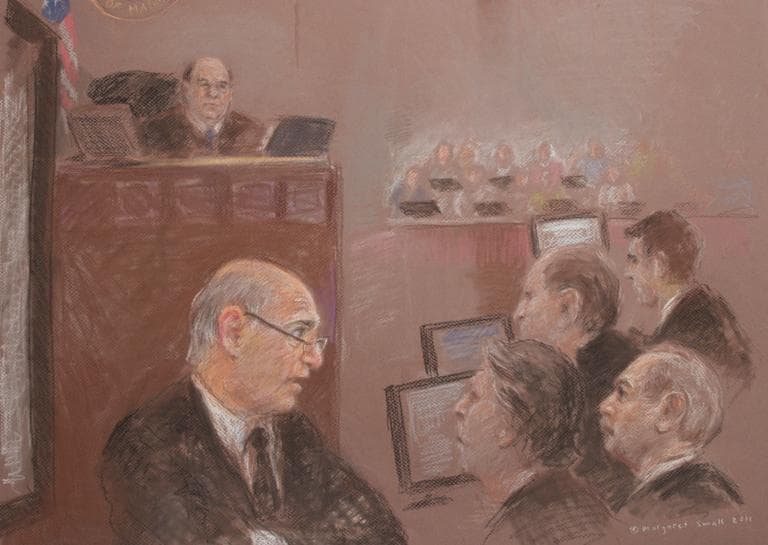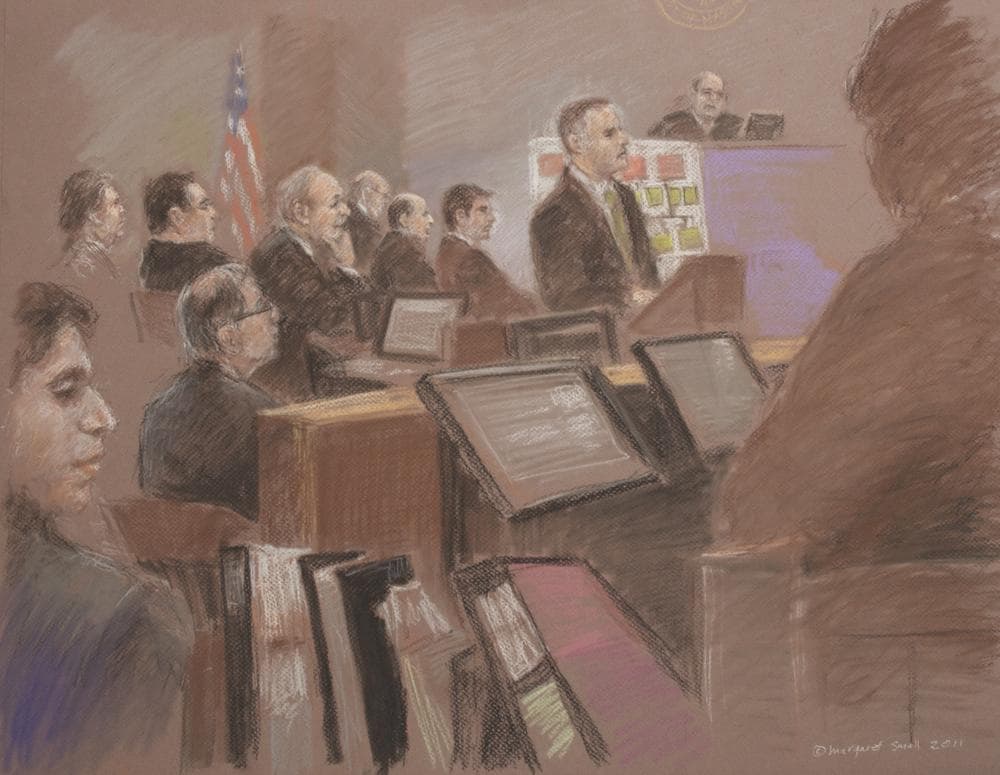Advertisement
DiMasi Trial Heads To Jury
Resume
The Joseph Moakley Federal Courthouse is often called the House of Pain. Criminal defendants who go in are seldom better off when they come out. It’s where “the city meets the sea,” says its homepage, but the conviction rate of those who go to trial offers defendants only slightly better odds than lemmings.
The House of Pain
Generally speaking, there are only two ways to avoid the pain. The first, if it’s an option, is to become a cooperating witness, like Joseph Lally, the salesman of Cognos software and onetime defendant in the federal corruption trial of former Massachusetts House Speaker Salvatore DiMasi. Lally’s zeal in stalking big state contracts, he says, involved hundreds of thousands in kickbacks to then-Speaker DiMasi and his pals: Richard Vitale and Richard McDonough (often referred to as “Dick” and “Dickie”).
It is the testimony in this case that will probably result in Lally getting a recommendation from federal prosecutors that he serve no more than two to three years in prison instead of the seven to 10 he might get if he went to trial and got convicted. As part of his plea deal he also gets to keep his house, the government gives him back the money it took from him, and prosecutors drop other big-ticket charges like money laundering.
Though it’s not pain-free, the Lally option avoids far worse pain. And it’s telling that a guy who never saw a casino or a roulette wheel he didn’t like decided he was better off taking this option than rolling the dice on the one option that might let him walk out of the court a free man.
Martin 'Marty' Weinberg: 'The Best Lawyer Money Can Buy
That way means going to trial and finding yourself the best lawyer money can buy. That’s what put Martin (everyone calls him “Marty”) Weinberg in Courtroom No. 10 for closing arguments last Friday.
Weinberg represents defendant Vitale, the accountant and wealth manager who can afford him, unlike DiMasi, whose legal costs are being written on the sleeve of taxpayers. But Weinberg has acted as the lead attorney for the defense.
“This case is built on a foundation of quicksand that sinks in that quicksand because Joseph Lally does not have the moral character to tell the truth,” Weinberg told the jurors.
Eloquence, grace and mastery of command emanate from Weinberg like rays of light glinting off his crown. The only thing he’s lost over years of defending high-profile clients from charges of murder, money laundering and securities fraud is the hair on top of his head.
Quoting the hallowed words on the wall in the oldest courthouse in England, Weinberg urged the jurors on to a higher call. “When the liberty of an Englishman is preserved against unjust conviction, the Crown wins.”
The Prosecution Builds Its Case
You don’t get ascendant vocabulary or the verse like this from mid-level career prosecutors with the Department of Justice. But on Friday, they delivered something else: the articulation of a chain of circumstantial evidence, buttressed by phone and email records and the testimony of 24 witnesses, woven into the noose of a devastating narrative.
“The defendants want you to abandon common sense and believe those payments were made in good faith,” said prosecutor Anthony Fuller.
“I want you to remember your common sense…When a public official takes action in return for payments to his friends, that is not just a breach of duty; that’s a federal crime.”
Fuller, a former Marine whose courtroom manner has been halting and whose voice has limited range, took the platoon of jurors onto a 90-minute ground campaign. As DiMasi watched, his head cocked to an angle, alternately frowning and scowling, Fuller related the alleged scheme yard by yard. How a man with a lifestyle he couldn’t afford, with multiple mortgages and a monthly credit card bill of $50,000, sold his office.
Fuller started with the monthly Cognos payments Lally arranged for DiMasi’s law associate, Steven Topazio, through a contract the unwitting Topazio expected involved legal work. Topazio sent $65,000 of that Cognos money to DiMasi for referring the client to him, but DiMasi knew and never told Topazio the whole thing was “a sham," according to Fuller.
Pointing to DiMasi, Fuller said that Lally “knew he was going to get those [$17 million in state contracts] because he was paying this man right over there!”

Why do people lie and cover up like these defendants did? Fuller asked the jury. “Because they know what they’re doing is not legal.”
What the ex-Marine and the prosecution team lacked in eloquence and style, it made up for in grunt work. The government also has the long reach of the federal Honest Services statute, whose vague wording reaches too broadly, according to its many critics, and makes it easier for prosecutors to win convictions against public officials like DiMasi who are charged with schemes “to defraud and deprive the citizens of their intangible right to honest services.”
It would have helped Weinberg and his fellow attorneys if they could present their own narrative line. But since they called just three witnesses, and none of their clients dared take the stand to proclaim their innocence, the defense, “the phantom defense,” as lead prosecutor Ted Merritt called it, came to this: the government hadn’t proved its case.
“They must convince you that Salvatore DiMasi is guilty, not could be, may be, might be,” practically shouted William Cintolo, one of two lawyers for DiMasi. Cintolo is a booming, rough and tumble kid from Revere who pronounces “Revere” with only one "r."
“We don’t work on ruh-mahs in this court. We work on hahd facts that you can look at, touch see, and appreciate.”
The Case Against Lally
There is no proof that DiMasi caused payments to his fellow defendants in exchange for using his office to steer state contracts to Cognos, the defense argued or that there was an agreement. But, as if they had surmised that wasn’t going to be defense enough, the defense spent most of its time on another strategy: get Lally.
“A low bum. The next time he tells the truth will be the first time he tells the truth,” snapped the diminutive, fast-talking defense attorney Tom Drechsler. Like a Scotty terrier clutching the pant leg of a target who can’t shake him, Drechsler attacked the government’s star witness in a frenzy.
“Greed pervades Mr. Lally’s soul in everything he does…No lie was too big, no lie was too small…They own him. He’s their witness…The government’s witness is a liar.”
And not only a liar, but a cheat, a tax evader, a thief, and not just a gambler, but a “degenerate” gambler as the lawyers continually pointed out.
Drechsler was hitting a chord with the crowd in the courtroom, packed with family and friends of the three defendants, “the boys,” as one supporter called the three close friends. And he set them into derisive laughter as he imitated Lally, the witness eager to win the government’s recommendation for a short sentence.
“How can I please the U.S. attorney? How can I please the U.S. attorney. Game, se,t match. Game, set, match,” Drechsler said.
DiMasi, facing the prospect of long prison time and separation from the family that has been here every day of his trial, broke into a smile. Cintolo made the last closing argument and made DiMasi and his supporters laugh when he recalled Lally testifying that out on a golf course, DiMasi had urged the conspirators to use his remaining time as speaker to “make as much hay as possible.”
“Can you imagine a North End kid, who spent all his life there, saying, 'Let’s make hay?' Cintolo asked. “He puts words in DiMasi’s mouth to get what he wants.”
It was great stuff from Cintolo. But the problem for the defense is that there’s much more to the prosecution’s case than just Lally and 23 more witnesses.
“[Lally] is the centerpiece of the defense’s case, not the government’s," stated Merritt, who closed over six intense hours of closing arguments with a 20-minute rebuttal for the government.
And here is where the defense case might be at its weakest.
Yes, Lally was a tax cheat, a gambler, a liar in business, conceded the government. But what was someone like him doing with DiMasi’s cellphone number and meeting with DiMasi to talk about contracts, or even playing golf with him? Why were DiMasi's best friends doing business with Lally in the first place?
“It wasn’t the government who chose Joseph Lally to be in this conspiracy. It was his co-conspirators,” Merritt told the jurors at the end of the day. “Hold these defendants accountable for their illegal activity and find them guilty.”
On Monday, the judge will instruct the jurors on the law, and they will start deliberating whether DiMasi or his fellow defendants escape the House of Pain.
This program aired on June 13, 2011.
